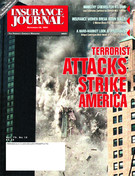No words will ever be able to fully convey the shock and the stunned incredulity around the world as the Sept. 11th terrorist attacks unfolded on television screens across the globe.
Live coverage on French television began shortly after the first aircraft struck the North Tower of the World Trade Center, and captured the subsequent ghastly sequence of events as they happened. The BBC began broadcasting continuous coverage of the attacks and the repercussions they will have throughout the world.
The first reactions of incredulity and horror cannot be put aside. The images are burned into the collective memory of millions of individuals and will remain with them forever. The sheer magnitude of the attacks and the enormous loss of life go well beyond any previous terrorist acts. No one, except perhaps some combat veterans, had ever witnessed such carnage, and no one will ever forget it.
After the initial shock, world leaders expressed their sympathy and condolences to the American people. France’s President Jacques Chirac canceled a series of appearances in Brittany to return to Paris, to head a crisis committee. Fearing attacks in France, the government announced new measures aimed at tightening security.
Britain’s Tony Blair said he was ready to fully back the U.S. in determining who was behind the attacks, and insuring that they are punished. Blair, like other world leaders, however, cautioned against rushing to premature conclusions and taking precipitate action. Prof. Paul Rogers of Bradford University told the BBC that Britain had a role to play in reigning in unilateral U.S. action, and making sure that there was a coordinated worldwide response.
Most commentators echoed the words of Former National Security Advisor Richard Perle, that the nature and scope of these attacks marked a “fundamental change” in the nature of the terrorist threat faced by the U.S. as well as a number of other countries. Germany’s Chancellor Gerhard Schroeder called the acts a new phenomenon, not just isolated acts of terrorism, but the equivalent of a declaration of war, and warned of a long struggle.
The similarity between yesterday’s destruction and the attack on Pearl Harbor 60 years ago was often mentioned in analyzing possible U.S. reactions. The BBC’s Defense Correspondent Jonathan Marcus echoed Schroeder in saying that the U.S. faced a long struggle to root out and destroy global terrorism. He also noted that the U.S. really has no choice but to take the lead and cannot unilaterally withdraw from its position as the world’s premier power.
The leaders of almost every other country expressed similar reactions and great sympathy for the people of the U.S. Even Iran, Syria and Libya, not normally considered friends, condemned the attacks and sent their condolences.
The insurance community is equally stunned and horrified by the tragic events. It will be some time before any meaningful estimates of the losses can be made, but they will be horrendous. Reinsurers and the Lloyd’s market will be especially hard hit, as well as international carriers. Over the coming months, insurers will face up to the flood of claims from the airlines, the property owners, the injured and the heirs of thousands of people who died in the ruins of the World Trade Center and the Pentagon.
For now, all one can do is feel stunned and horrified at the extent of the barbarity that one small group of fanatics can inflict on so many innocent people. FDR called Dec. 7, 1941, “a day which will live in infamy.” Now Sept. 11, 2001, will too.
Topics Catastrophe USA Natural Disasters
Was this article valuable?
Here are more articles you may enjoy.


 Florida’s Commercial Clearinghouse Bill Stirring Up Concerns for Brokers, Regulators
Florida’s Commercial Clearinghouse Bill Stirring Up Concerns for Brokers, Regulators  The $3 Trillion AI Data Center Build-Out Becomes All-Consuming for Debt Markets
The $3 Trillion AI Data Center Build-Out Becomes All-Consuming for Debt Markets  Insurify Starts App With ChatGPT to Allow Consumers to Shop for Insurance
Insurify Starts App With ChatGPT to Allow Consumers to Shop for Insurance  Trapped Tesla Driver’s 911 Call: ‘It’s on Fire. Help Please’
Trapped Tesla Driver’s 911 Call: ‘It’s on Fire. Help Please’ 


